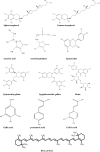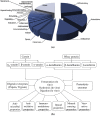Functional dairy products as a source of bioactive peptides and probiotics: current trends and future prospectives
- PMID: 35250052
- PMCID: PMC8882518
- DOI: 10.1007/s13197-021-05091-8
Functional dairy products as a source of bioactive peptides and probiotics: current trends and future prospectives
Abstract
Milk is an incredibly healthy food world-wide. However, the 'lactase deficient' individuals cannot digest milk's carbohydrate lactose. A large part of the world population is depriving of highly beneficial milk proteins like casein, lactoalbumin, lactoglobulin, etc. due to lactose intolerance. Production of functional foods and bioactive peptides from milk with natural antioxidants and the addition of probiotics could be the best alternative to extend the use of milk functionalities. Among different probiotics, the lactic acid bacteria (LAB) like Lactobacillus delbrueckii sub sp. bulgaricus, Streptococcus thermophilus and some species of Bifidobacteria and their metabolites (paraprobiotics and postbiotics) have been given more preference to add in milk-derived functional foods. These species are generally considered as heat-tolerant, highly proteolytic, and peptidolytic towards milk proteins and they liberate smaller molecules of bioactive peptides during fermentation and other processes that stimulate the enzyme lactase to help people in digestion of milk carbohydrate lactose. Moreover, the incorporation of natural antioxidants in yoghurt and other dairy products prevents the rancidity of milk fat. The level of bioactive peptides produced in milk-derived functional foods can be determined by capillary zone electrophoresis, mass spectrometry, fractionation, and other modern assessment techniques. Commercial production of functional probiotic products with bioactive peptides could significantly contribute to reduce milk spoilage, enhance health benefits as well as the growth of the agro-processing industry.
Keywords: Bioactive peptides; Fermented dairy products; Lactic acid bacteria; Milk; Natural antioxidants; Probiotics.
© Association of Food Scientists & Technologists (India) 2021.
Conflict of interest statement
Conflict of interestThe authors declare that they have no conflict of interest.
Figures




References
-
- Abdel-Hamid M, Romeih E, Huang Z, et al. Bioactive properties of probiotic set-yogurt supplemented with Siraitia grosvenorii fruit extract. Food Chem. 2020;303:125400. - PubMed
-
- Agrawal H, Joshi R, Gupta M. Isolation, purification and characterization of antioxidative peptide of pearl millet (Pennisetum glaucum) protein hydrolysate. Food Chem. 2016;204:365–372. - PubMed
-
- Aguilar-Toala JE, Garcia-Varela R, Garcia HS, Mata-Haro V, Gonzalez-Cordova AF, Vallejo-Cordoba B, Hernandez-Mendoza A. Postbiotics: an evolving term within the functional foods field. Trends Food Sci Technol. 2018;75:105–114.
Publication types
LinkOut - more resources
Full Text Sources
Miscellaneous
